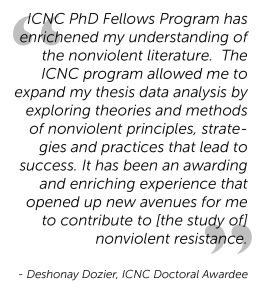ICNC's 2019 Doctoral, Post-Doctoral and Junior Faculty Research Fellowship
The application window is now closed.
ICNC’s Doctoral, Post-Doctoral and Junior Faculty Research Fellowship enables selected researchers to carry out research on civil resistance and/or conduct a study that can benefit from a civil resistance perspective. The fellowship is expected to lead to a peer-review publication in the form of a journal article, book or a book chapter. In some cases, and by mutual agreement, the research could be published as part of the ICNC Special Report or Monograph series.
Each fellowship award will be between $2,000 and $8,000. In addition to the stipend, the fellowship includes several hours of scholarly mentorship provided by one of the ICNC’s Academic Council members. Mentorship is set up when ICNC matches an awardee with an academic advisor interested in the awardee’s research topic.
Who Should Apply
 Eligible applicants must be one of the following:
Eligible applicants must be one of the following:
- Junior faculty on a tenure-track position and not yet tenured
- Part-time and full-time post-doctoral researchers. In exceptional circumstances, we can consider applications from post-doctoral candidates who are currently unemployed and unaffiliated but who can demonstrate that they are actively looking for employment in their area of specialization
- Lecturers or assistant professors who are working to secure a permanent faculty appointment, or to advance to an associate professor or a senior lecturer position or
- Doctoral students at an accredited university inside or outside their home country.
Applicants must further meet the following eligibility criteria:
Ph.D. students:
- Has completed at least 12 months of Ph.D studies before the date of the application or completed all Ph.D coursework within a minimum, 10-month period
- Has at least 18 months remaining –from the date of the submission of the application for the ICNC stipend program– to complete and submit a doctoral dissertation
- Has a Ph.D thesis that can be enriched by integrating a new or more in-depth analysis of one of the priority research topics in civil resistance or one of the additional themes of interest to ICNC listed above.
- Preference will be given to proposals that focus on specific movements and campaigns across time, space, and systems. Comparative studies of movements and multi-case studies will be given preference over general and/or single case studies. Mixed quantitative and qualitative methodologies are strongly encouraged. Research proposals that study general civil society are outside the range of this fellowship and will not be accepted. The proposal may touch on structural factors that impact civil resistance movements, but must make the civil resistance movement or campaign the primary focus of the research
- Demonstrates in the application a good command and understanding of the civil resistance literature and its relevance to their work
Post-Doctoral & Junior Faculty:
- Has completed their Ph.D. in the last 5 years
- Has a part-time or full-time teaching or research appointment at a nationally accredited academic institution. In exceptional circumstances, we can consider applications from post-doctoral candidates that are currently unemployed and unaffiliated but that can demonstrate that they are actively looking for employment in their area of specialization.
- Plans to start, has started or is continuing work on a peer-review publication that could be enriched or benefit from an in-depth theoretical or empirical civil resistance perspective—and integrating a new or more in-depth analysis of one of the priority research topics in civil resistance or one of the additional themes of interest to ICNC listed above.
- Preference will be given to proposals that focus on specific movements and campaigns across time, space, and systems. Comparative studies of movements and multi-case studies will be given preference over general and/or single case studies. Mixed quantitative and qualitative methodologies are strongly encouraged. Research proposals that study general civil society are outside the range of this fellowship and will not be accepted. The proposal may touch on structural factors that impact civil resistance movements, but must make the civil resistance movement or campaign the primary focus of the research
- Demonstrates a good command and understanding of the civil resistance literature and its relevance to their work
Research Topics of Interest to ICNC
The Research Fellowship aims to support writing on civil resistance for peer-reviewed publications that include:
- In-depth analysis of civil-resistance-related literature; with relevant findings incorporated into fellows’ writings;
- Fieldwork or data collection and analysis related to civil resistance case studies; or
- Archival work to recover information about civil resistance or case histories of civil resistance.
ICNC Priority Research Topics in Civil Resistance (2019-2020). The research will either be informed by a large N quantitative analysis and/or in-depth case studies and/or comparative analysis of nonviolent campaigns and movements.
Topics are not listed in order of priority.
-
- What is the impact of violent flanks on nonviolent movements, on the trajectory of nonviolent struggles, their effectiveness, eventual outcome and impact and how nonviolent movements can plan better to prevent violent groups from taking over
- Civil resistance to counter populism and nationalism at the age of democratic backsliding: civil resistance in falling and failing democracies
- Civil resistance strategies, including leverage and resilience of nonviolent mobilization and organizing at a time of re-emergent authoritarianism
- Nonviolent resistance strategies to reduce societal violence and/or marginalize violent radicals and other non-state actors (i.e. criminal groups; militias and paramilitaries engaged in civil war; extremist and terrorist groups)
- Assessing the impact of civil resistance knowledge and skills acquisition on civil resistance movements
- The role and impact of women in civil resistance movements
- Gender analysis of civil resistance
- Civil resistance strategies to fight climate change
- Psychological factors and the role of emotions in movement emergence and civil resistance
- The impact of civil resistance on defections from supporters of a movement’s opponent such as members of the business community, banks and finance, bureaucracy, religious organizations, members of the security forces, state-controlled media, and other pillars of support
- Strategies for civil resistance campaigns against abusive or unaccountable practices involving multinational corporations—where and how do movements and their allies target or pressure; what strategies, tactics, and framing are most effective; etc.
- Popular grassroots movements on the margins (landless peoples, unemployed, underprivileged) that demand inclusion, an end to discrimination, access to resources and better services in a nominal democracy
- Constructive resistance in the form of parallel institution-building, alternative services and networks and the broader political, social and/or economic impacts of nonviolent movements
- Civil resistance and how it can contribute to peacebuilding
- The role and impact of a variety of external actors in civil resistance struggles
- Nonviolent national defense (sometimes referred to as civilian-based defense) in the area of foreign-led hybrid or disinformation warfare
Additional themes of interest:
-
- Study of intersectionality between broad based pro-democracy movements and non-traditional, under-represented movements and groups such as LGBT, or ethnic minorities
- Why some actors choose nonviolent resistance and others resort to violent means
- Assessment tools for movements—how do movements assess their current state and progress over time?
- How localized protests, and everyday resistance turn into national political movements
- Analysis of strategic approaches to sustaining movements and building resilience, despite fear and apathy
- The role and impact of civil resistance on people’s and states’ identities and/or aspirations
- Civil resistance and negotiations
- Different forms of leadership in civil resistance
- Civil resistance and international law—Are acts of civil resistance protected under international law? How civil resistance impact international law
- National or local surveys on the potential for, and effectiveness of, civil resistance methods in war-torn societies
- Review of studies across disciplines about the onset of civil resistance movements under repressive conditions using a civil resistance perspective
- Conceptual analysis and empirical study of formation of diverse social coalitions as part of civil resistance movements
- Civil resistance and the prevention of major atrocities
- The use and impact of new technologies in civil resistance struggles
- The role of constructive programs and alternative institution building in civil resistance
- Failure of civil resistance in crucial cases/campaigns: lessons learned
- Recovering historical cases of civil resistance struggles that are unknown or under-researched
- Comparative studies of recent civil resistance cases in a region or across regions, with emphasis on Latin America, sub-Saharan Africa, Asia and the Pacific region
- Studies of the situations in which civil resistance is justified and appropriate and situations in which it may be misused or used by repressive actors
- The role of nonviolent resistance strategies in international solidarity movements in support of nonviolent struggles
- The role and impact of civil resistance before, during, and after political transitions
- Why and how civil resistance movements maintain nonviolent discipline
Fellowship Expectations and Disbursements
Fellowship Requirements:
Once the fellowship is awarded, research fellows are expected to:
- Negotiate and sign an Independent Contractor contract with ICNC
- Deliver regularly scheduled reports on the progress of the ICNC supported research
- Produce, by the end of the fellowship, at least one finished draft of piece that will be submitted as part of a peer-reviewed publication or outlet by the end of the fellowship, which could be a journal article, book manuscript, book chapter, or ICNC Special Report or Monograph relevant to civil resistance.
The fellowship stipend will be disbursed in installments. The installments will be made based on an agreed-upon schedule for the submission of relevant assessments and drafts, leading up to the completion of a written draft for a peer review publication.
Each installment will be made contingent upon positive evaluation of the submitted work and satisfactory progress toward completion of the thesis and/or of the written draft for a peer-review publication.
Apply Now
Applicants need to fill out the online application form and upload the following documents:
For Ph.D. applicants:
1. A copy of the most current Ph.D transcript indicating grades earned thus far
2. A department or supervisor’s letter indicating applicant’s current year of Ph.D studies and the expected date (month/year) of the thesis completion and submission
3. A 1,000-word Ph.D. thesis proposal which clearly explains: 1) how the Ph.D research conducted so far can benefit from a new or greater focus on civil resistance; 2) how a selected civil resistance focus relates to at least one of the priority research topics; and 3) how the stipend on civil resistance will help enhance both the applicant’s thesis and contribute to the field of civil resistance more broadly;
4. A 1000-word literature review on civil resistance, highlighting works on civil resistance that the applicant sees as most pertinent and explaining their theoretical and empirical relevance to, and significance for, arguments, analysis, findings and/or cases that are part of the applicant’s Ph.D thesis. Prior to preparing the literature review applicants are strongly encouraged to review the following resources:
- an online guide to civil resistance literature (2013)
- selected list of literature on civil resistance (2016)
- list of expanded bibliographical entries on civil resistance (2016)
- Nonviolent struggle literature review (2015)
- ICNC Academic Online Curriculum with relevant reading and video resources on civil resistance
- ICNC Resource Library
5. Budget justification with a detailed budget proposal for research that contains expected costs and an explanation of how the requested funds will be used to support or conduct the research. The ICNC fellowship does not support tuition expenses. The ICNC fellowships range between $2,000 to $8,000. Fellowship stipends are not a substitute for a salary. ICNC provides the fellowship stipend in order to support the fellows in conducting their research.
6. Most recent CV/Resume
7. A writing sample of no more than 1,000 words. Our preference is for a sample that has not been published and it should not include the literature review submitted for this application.
For Post-Doctoral and Junior Faculty applicants:
1. A letter from the university/department confirming their appointment as a part-time or full-time faculty
2. A 1,000-word proposal for a peer-reviewed journal article, book chapter, book, or ICNC publication that clearly explains: 1) how the writing can benefit from a new or greater focus on civil resistance; 2) how a selected civil resistance focus relates to at least one of the priority research topics; and 3) how the ICNC stipend will help enhance the quality of the publication and contribute to the field of civil resistance more broadly;
3. A 1000-word literature review on civil resistance, highlighting works on civil resistance that the applicant sees as most pertinent and explaining their theoretical and empirical relevance to, and significance for, arguments, analysis, findings and/or cases that are part of the applicant’s proposed peer-review publication. Prior to preparing the literature review applicants are strongly encouraged to review the following resources:
- an online guide to civil resistance literature (2013)
- selected list of literature on civil resistance (2016)
- list of expanded bibliographical entries on civil resistance (2016)
- Nonviolent struggle literature review (2015)
- ICNC Academic Online Curriculum with relevant reading and video resources on civil resistance
- ICNC Resource Library
4. Budget justification with a detailed budget proposal for research that contains expected costs and an explanation of how the requested funds will be used to support or conduct the research. The ICNC fellowship does not support tuition expenses. The ICNC fellowships range between $2,000 to $8,000. Fellowship stipends are not a substitute for a salary. ICNC provides the fellowship stipend in order to support the fellow in conducting their research.
5. Most recent CV/Resume
6. A writing sample of no more than 1,000 words. ICNC’s preference is for a sample that has not been published and it should not include a literature review submitted for this application.

